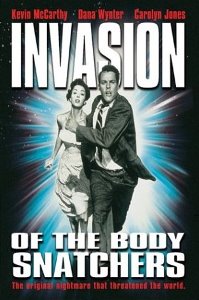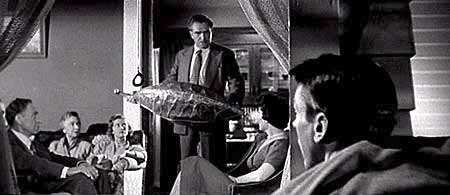I give this movie 4.5 Reagans (out of 5).
When I first set up our Blockbuster account on line, I filled the queue with a ton of classic movies that I’d never seen, but had been endlessly parodied, referenced, revered, referred to, and mocked over the years in our popular culture. Some of them are older, and my wife loves to make fun of me for getting them – especially the science fiction ones. But since I don’t like to be left out of the jokes or the references that come along, I get them anyway. And sometimes my wife even enjoys them, too.
And so it came to pass that the 1956 original Invasion of the Body Snatchers arrived in our mailbox.
~~~
As much as this movie (or at least its title) is infused in our pop culture, I actually didn’t really know the plot. I knew it involved some aliens stealing humans or taking their form or something, but that was it.
For the uninitiated (spoilers, but it’s important to the discussion), the story tracks Miles Bennell, a doctor in a small, idyllic 1950s California town who comes back from vacation and discovers a very subtle alien invasion underway. It turns out that beings from another world traveled here as seeds, and landed in a farmer’s field. These seeds grow into pods, which, when placed near a human being, grow a replica of said human inside of them. Personally, I prefer human reproductive methods, but who am I to judge another culture?
The problem is that the pod people need to absorb the memories of the people they replicate, which they can only do while people are sleeping. The new “people” are the aliens, who are just like the people they replaced except that they’ve lost their emotionalism and individualism.
At the end, when the heroes are finally captured, one of the pod people tries to convince the doctor that there is nothing to be afraid of – they’ll be the same people, just without the pain of all that emotionalism. They won’t have to think for themselves, or feel anything for themselves. Of course, this means they give up all the good emotions, too, but how good are they really? What’s love got to do with it? Who needs a heart when a heart can be broken?
~~~
The doctor and his love interest risk their lives to escape this utopia, and that’s what makes this such a conservative movie. There is no moral equivalence attempted, no serious argument that the alien culture might be better than ours, or even on par. The idea that one would give up his individuality, his ambition, his ability to love and form close relationships is assumed to be bad. Without risk, there is no reward – and that’s a fate worse than death.
The other important piece of the conservative picture is that the humans being chased by the pod people aren’t given a choice. If it was really that much better, they wouldn’t have to force anyone to join their seed-pod collective. And what may be worse than the emotionless fate itself is that the victims aren’t permitted to have any say in the matter. They are about to become slaves to the new order.
~~~
I was a little worried when I read the little Blockbuster jacket cover, which described it having “often been interpreted as a cautionary fable about the blacklisting hysteria of the McCarthy era.” Indeed, there are plenty of people who assume it’s a leftist screed, like this guy from Gadfly Online:
The film’s ideology is focused well to the left of center, despite the fact that Jack Finney’s story is centrist in nature. It was Daniel Mainwaring who followed out the pessimistic strain underlying Finney’s paranoid fantasy. As Al LaValley writes in Invasion of the Body Snatchers, “Mainwaring’s despair is the despair of a onetime strong leftist over the America of the fifties.” Indeed, the House Un-American Activities Committee had decimated Hollywood and the Hollywood Ten had gone to jail. A blacklist was in force, and everyone was being asked to sign a pod-like loyalty oath to prove they were “good” Americans and not Commie subversives. A chilling pod-like uniformity reigned in Hollywood. LaValley notes, “Risk was no longer acceptable; perhaps serious social subjects could be approached only in disguised form through the crime and science fiction genres.”
This declaration of leftism is silly, and representative of the fact that many leftists don’t actually have a clear and consistent idea what their underlying political principles are (how do you reconcile freedom from government control with big government and more regulation?), much less what Conservatism is all about. But that’s what you’d expect from someone who, earlier in the piece, insists that Senator McCarthy chaired the House Un-American Activities Committee. Conservatism is manifestly not defined as “anything that any Republican has ever proffered done, especially if it’s bad.”
What’s more, the movie as intended liberal metaphor (or any intended political work) was expressly rejected by one of the producers, who said:
People began to read meanings into pictures that were never intended. The Invasion of the Body Snatchers is an example of that. I remember reading a magazine article arguing that the picture was intended as an allegory about the communist infiltration of America. From personal knowledge, neither Walter Wanger nor Don Siegel, who directed it, nor Dan Mainwaring, who wrote the script nor the original author Jack Finney, nor myself saw it as anything other than a thriller, pure and simple.
~~~
One of the funny things about the idea that the movie was a warning about the “oppressive” ’50s is that the town the people were living in is a cookie cutter ’50s stereotype – and it’s shown as a happy, idyllic place. Part of the horror comes from the destruction of that happiness via the invasion.
But the larger irony is that the people who claim the film to be a liberal one justify that because of the destruction of individuality – the core principle of conservatism. In comparing the creep of the Pod People to the pressure of anti-communist groups and blacklists, they ignore that in the movie, overt power is used to force the individual to join the collective. The protagonist has no choice in the matter, no vote, no chance to write a newspaper critical of those in power, and most importantly, no ability to change his mind even if he chose Pod-ness. Say what you want about McCarthy – he was duly elected, had far less power than the myths give him credit for, and was rather quickly bounced by his colleagues for his methods – while the rest of the government, Democrats and Republicans, went right on (very correctly) worrying about communist infiltration in the US and abroad.
To the extent the government forced people to live and think a certain way in the 1950s, that wasn’t politically conservative. The reality, though, was that certain behaviors were simply frowned upon, and certain values were held in high esteem – to the great benefit of the nation. (Other than a few radicals, hippies, and the future generations who swallowed their myths, does anyone really think the ’60s were a better decade for raising a family or for an optimistic and prosperous America?)
What’s sad is that the same people who decry the “conformity” of the ’50s as a loss of individual liberty are the same ones who now insist we all let the government tell us how to spend our money, run our businesses, and use our property. They are the ones who grew up to create speech codes on universities, invented political correctness, and purged the education system of anyone who didn’t toe the liberal party line. They are the people who ignored Gran Torino at the Oscars.
Can’t they see the disconnect?
~~~
Ultimately, though, I think the producer quoted above had it right. There was no overt political message in Invasion of the Body Snatchers. (If there had been, I doubt it would have been nearly as good – no matter what the attempted message actually was.)
But it carried with it a universal truth we all intuitively understand to be correct – that our individuality matters more than our security, and that denying people the choice of their own destiny is a great evil. These themes are the core of Conservatism as a political ideology. The fact that this otherwise unremarkable low budget sci-fi flick still resonates so powerfully after half a century is a tribute to the power and inherent truth of these Conservative ideas.







Man, that’s some revue. I can hardly wait for you to see Forbidden Planet.